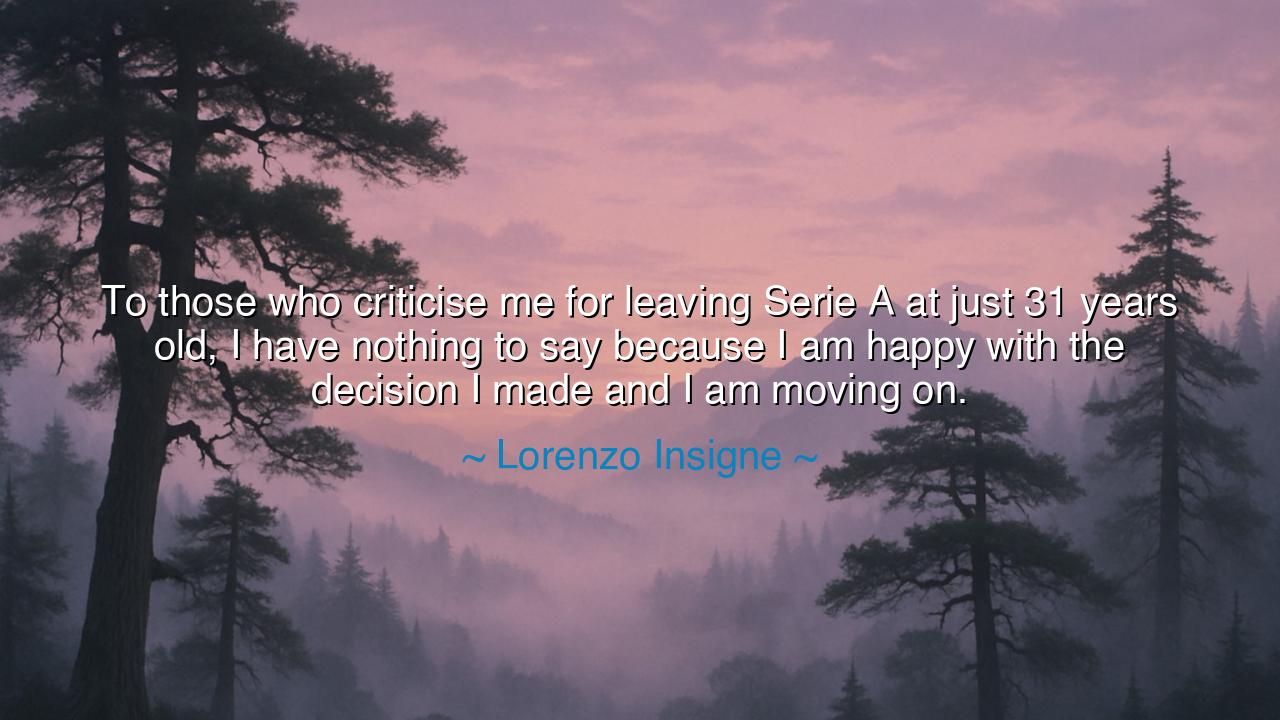
To those who criticise me for leaving Serie A at just 31 years
To those who criticise me for leaving Serie A at just 31 years old, I have nothing to say because I am happy with the decision I made and I am moving on.






The Italian footballer Lorenzo Insigne, beloved son of Naples, once declared: “To those who criticise me for leaving Serie A at just 31 years old, I have nothing to say because I am happy with the decision I made and I am moving on.” These words are more than the voice of an athlete; they are the testament of a man who has chosen peace over the noise of judgment, and courage over the chains of expectation. His statement, spoken in the twilight of one chapter of his career, carries the eternal lesson: that the true measure of a life is not found in the approval of others, but in the harmony of one’s own heart.
To be criticised is the common lot of all who dare to live visibly. The world loves to speak of what another should or should not do. Yet Insigne shows the wisdom of turning away from such voices. He answers not with anger, not with defense, but with silence — a silence louder than protest, for it proclaims: “Your judgment cannot bind me.” To stand firm in one’s choice, unmoved by the chorus of doubt, is the mark of inner strength.
The heart of his words lies in happiness with his decision. Many chase glory until their bodies falter, seeking to prolong applause even at the cost of peace. But Insigne chose another path: to honor the work already done, to step away before his flame was dimmed by regret, to seek new horizons rather than cling to old ones. In this, he reminds us that true success is not in how long we labor under the eyes of others, but in knowing when to lay down the burden and walk into new fields.
History offers us an echo in the story of Diocletian, the Roman emperor who, after ruling with iron strength, chose to abdicate the throne. The empire was astonished; few understood. But Diocletian, content in his garden, told those who urged him to return that he would rather tend cabbages than rule the world again. Like Insigne, he showed that wisdom is not in clinging to power or reputation, but in knowing when to step away, and in finding joy in the path chosen.
Insigne’s words also reveal the virtue of moving on. To move on is not weakness; it is the highest form of courage. It is to say: “What was, was beautiful, but it is complete. Now I turn my face to what is next.” Many remain shackled to their past glories or past failures, unable to let go. But the one who moves on carries within them the strength of renewal. For every ending, when embraced with grace, is the seed of a new beginning.
The lesson, then, is clear: live not for the applause of others, nor in fear of their disapproval. Be faithful to your own path. When the time comes to change direction, do so with dignity, even if others do not understand. Seek not to justify yourself endlessly, for those who wish to judge will judge regardless. Instead, as Insigne teaches, be at peace with your decision, and walk forward with quiet confidence.
Practical wisdom follows: when you make a choice for your own life — whether in work, in love, or in calling — ask only if it brings you truth and peace. If it does, then stand firm, and let the world say what it will. Do not dwell on the shadows of criticism, for they cannot dim the light of a contented heart. Instead, keep moving on, as the river flows, as the seasons change, as the soul grows.
So remember, O listener, the voice of Lorenzo Insigne: “I am happy with the decision I made and I am moving on.” May these words teach you that your life belongs not to the crowd, but to yourself. May they remind you that happiness in one’s choices is the truest form of victory, and that the noblest path is not always the longest, but the one walked with freedom and peace.






AAdministratorAdministrator
Welcome, honored guests. Please leave a comment, we will respond soon